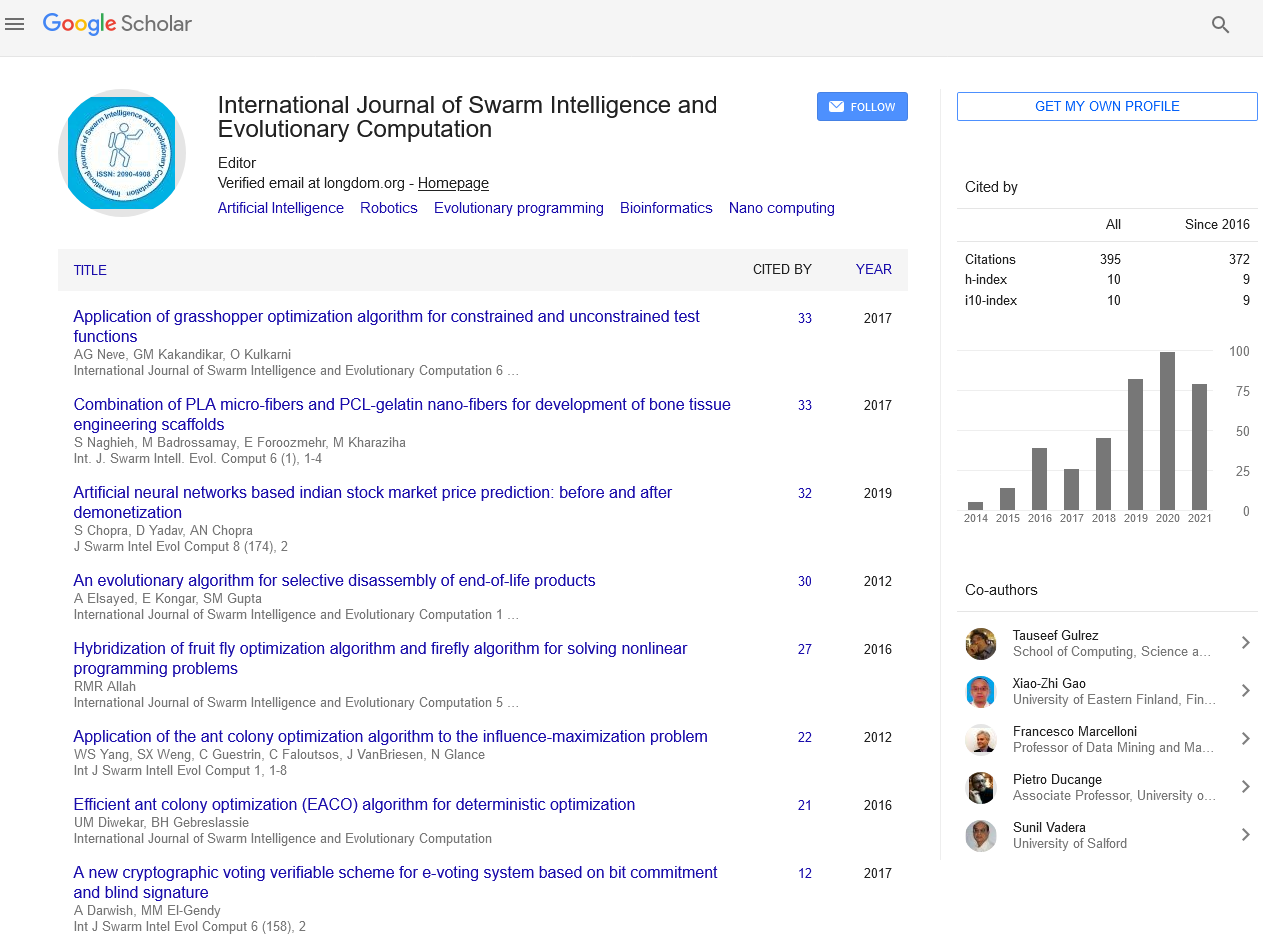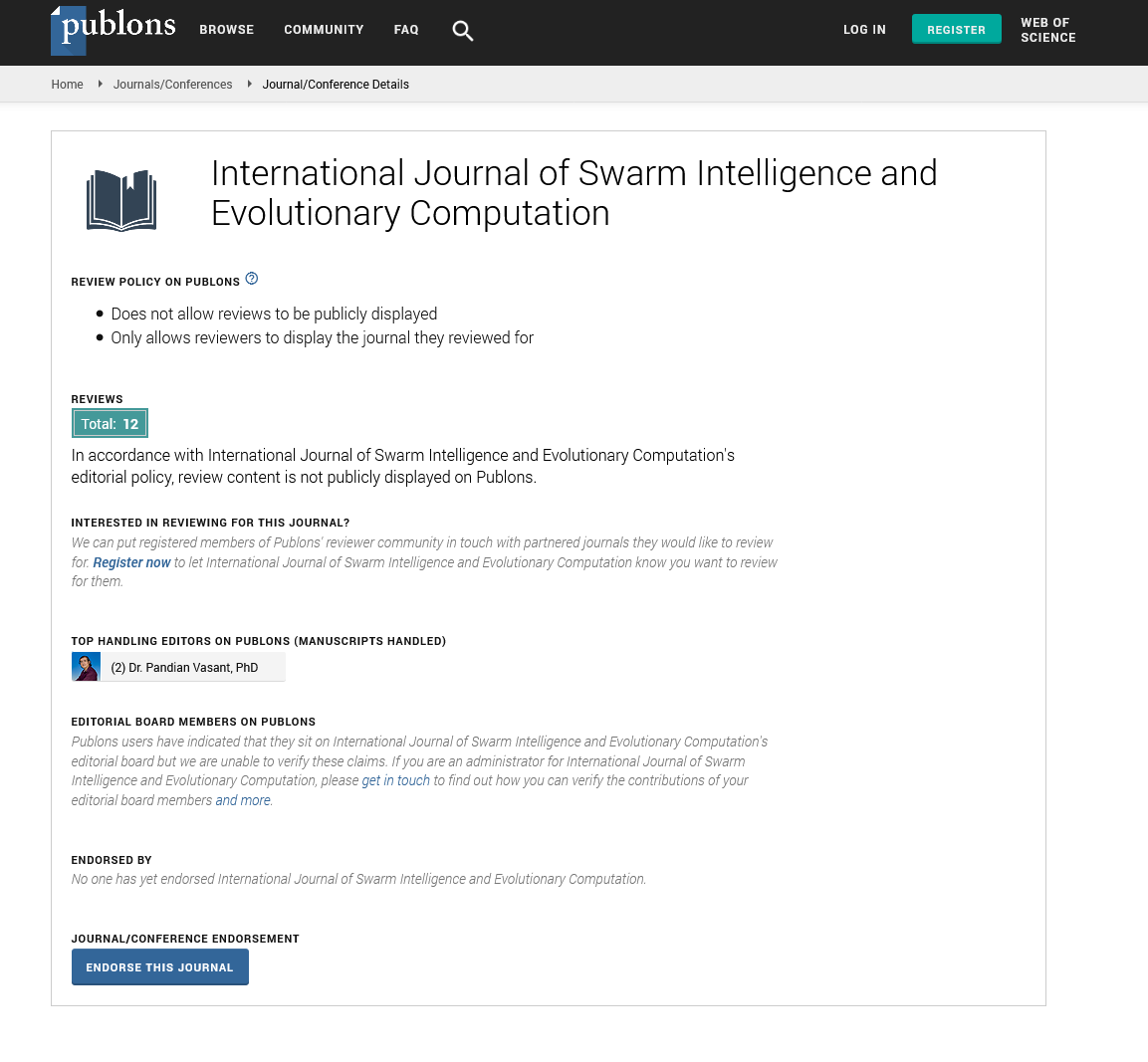Indexed In
- Genamics JournalSeek
- RefSeek
- Hamdard University
- EBSCO A-Z
- OCLC- WorldCat
- Publons
- Euro Pub
- Google Scholar
Useful Links
Share This Page
Journal Flyer

Open Access Journals
- Agri and Aquaculture
- Biochemistry
- Bioinformatics & Systems Biology
- Business & Management
- Chemistry
- Clinical Sciences
- Engineering
- Food & Nutrition
- General Science
- Genetics & Molecular Biology
- Immunology & Microbiology
- Medical Sciences
- Neuroscience & Psychology
- Nursing & Health Care
- Pharmaceutical Sciences
Commentary - (2025) Volume 14, Issue 1
The Rise of Robotic Intelligence: A Revolution in Automation
Graeme Richards*Received: 12-Feb-2025, Manuscript No. SIEC-25-28512; Editor assigned: 14-Feb-2025, Pre QC No. SIEC-25-28512 (PQ); Reviewed: 28-Feb-2025, QC No. SIEC-25-28512 (Q); Revised: 07-Mar-2025, Manuscript No. SIEC-25-28512 (R); Published: 14-Mar-2025
Description
Robotic intelligence is transforming the world, redefining industries, and reshaping the way humans interact with machines. As artificial intelligence (AI) continues to evolve, robots are becoming more autonomous, efficient, and capable of performing complex tasks that were once thought to be exclusive to humans. While the advancements in robotic intelligence offer numerous benefits, they also pose ethical and societal challenges that must be addressed to ensure a balanced integration into our daily lives.
Benefits of robotic intelligence
One of the most significant advantages of robotic intelligence is its ability to enhance productivity and efficiency. In industries such as manufacturing, healthcare, and logistics, intelligent robots can perform repetitive and labor-intensive tasks with precision and speed. This leads to increased output, reduced human error, and improved overall efficiency. In healthcare, for example, robotic-assisted surgeries have significantly enhanced precision and reduced recovery times for patients, demonstrating the profound impact of robotic intelligence in medical advancements.
Additionally, robots equipped with AI-driven intelligence are playing a crucial role in hazardous environments. Whether it is deep-sea exploration, space missions, or disaster response, robotic intelligence allows machines to operate in extreme conditions where human safety would be at risk. This not only expands the scope of scientific discovery but also provides critical assistance in emergency situations, such as search and rescue operations after natural disasters.
Ethical and societal concerns
Despite its benefits, the rapid advancement of robotic intelligence raises ethical and societal concerns that cannot be overlooked. One of the primary concerns is job displacement. As robots become more proficient in performing tasks traditionally handled by humans, the fear of widespread unemployment looms large. While automation creates new job opportunities in AI development, maintenance, and oversight, there is an urgent need to upskill the workforce to adapt to the changing job landscape.
Another pressing issue is the ethical dilemma surrounding autonomous decision-making. As robots become more independent in their actions, questions arise about accountability and responsibility. For example, in the case of selfdriving cars, who should be held accountable in the event of an accident the manufacturer, the programmer, or the AI itself? Establishing clear legal and ethical frameworks is crucial to addressing these concerns and ensuring that robotic intelligence is developed and deployed responsibly.
Future of robotic intelligence
The future of robotic intelligence is both exciting and uncertain. Innovations in machine learning, computer vision, and natural language processing are paving the way for even more advanced robots capable of understanding and interacting with humans in a more intuitive manner. From humanoid robots assisting the elderly to AI-driven robotic assistants in households, the possibilities are limitless.
However, to maximize the benefits of robotic intelligence while mitigating its risks, a collaborative approach is essential. Governments, industries, and researchers must work together to establish policies and regulations that promote ethical AI development, workforce adaptability, and societal well-being.
Conclusion
Robotic intelligence is undoubtedly revolutionizing the way we live and work. While it offers significant advancements in automation, healthcare, and exploration, it also presents ethical and societal challenges that must be addressed. By fostering responsible innovation and preparing for a future where humans and robots coexist harmoniously, we can ensure that robotic intelligence serves as a force for progress rather than disruption.
Citation: Vander A (2025). The Rise of Robotic Intelligence: A Revolution in Automation. Int J Swarm Evol Comput. 14:412.
Copyright: © 2025 Vander A. This is an open-access article distributed under the terms of the Creative Commons Attribution License, which permits unrestricted use, distribution and reproduction in any medium, provided the original author and source are credited.


